INVESTIGATION: CDC Upset Their Own Expert Advisers Not Recommending Masks, Demands They Recommend Masks
Too much science is forcing CDC to request a science do over after CDC’s own scientist and outside experts find N95 respirators don’t work better than masks—and neither do much to protect from COVID.
9 minute read
CORRECTION: The systematic review on masks published on the CDC’s website that found no difference between N95 respirator and masks at preventing respiratory virus spread was done by CDC researchers, not outside experts advising the agency. Language has been altered to reflect that.
Who wants to die on a hill promoting the bumper sticker thesis that “masks work” to stop COVID and other respiratory viruses? Apparently, the CDC.
Two years back, the agency picked a bunch of science experts and asked them to update the agency’s scientific guidance to hospitals on how to control infections. Hospitals and government agencies use CDC guidance to set their own policies, but the guidance for controlling infections has not been updated since 2007.
Last November, the experts sent the CDC a 20-page document, with 4 pages of scientific references, updating the government’s advice for controlling infections. But the process took an odd turn, last week, when the CDC sent a letter back to these experts—again, experts that the CDC picked themselves—that asked the experts to redo their expert advice.
You’re probably asking yourself, Why did the CDC pick a bunch of experts to give them advice. And when the experts gave them that advice, the CDC said, “Hey, can you give us some different advice?”
It’s a little nutty, right? Wait. ‘Cause it’s gonna get really crazy.
Last summer one of the CDC’s own scientists gave a presentation at one of the meetings the experts held. She told the experts that she examined whether N95 respirators work better at stopping viruses than masks.
Despite people waving around studies and essays saying that N95s respirators work better at stopping viruses than surgical masks, CDC’s scientist reported that the evidence “suggests no difference” in their effectiveness.
The CDC then posted on the agency’s website a “systematic review” that CDC researcher did to examine whether N95s work better than masks. For those who don’t understand systematic reviews, they are highly structured analyses that rely on the best available evidence, to provide the best available answers.
Guess what the CDC’s own researchers reported last November? The CDC’s researchers found there is no difference, meaning respirators don’t seem to work any better than masks.
This finding did not sit well with the CDC. Complaining about the experts’ guidance in a blog post last week, the CDC warned them they had gotten the science wrong:
Another issue relevant to preventing transmission through air is to make sure that a draft set of recommendations cannot be misread to suggest equivalency between facemasks and NIOSH Approved respirators, which is not scientifically correct nor the intent of the draft language. Although masks can provide some level of filtration, the level of filtration is not comparable to NIOSH Approved respirators.
The CDC did not respond to multiple requests for comment.
If you’re confused, you should be. Here’s what’s going on.
The great mask flip flop of 2020
Prior to 2020, hardly anybody recommended masks to stop viruses, because there’s no evidence they do so. “No evidence that face masks are effective in reducing transmission of laboratory-confirmed influenza,” stated the World Health Organization in 2019. Even the CDC’s own guidance on virus control advised mask only be worn by sick people to prevent them from infecting others, which is known as “source control.”
“There’s no evidence a mask is going to keep you from getting it,” said Yale Medical School’s Dr. Lisa Sanders, during an early 2020 Yale Forum on the coronavirus outbreak. Other panelists seated with Dr. Sanders nodded along.
Even Anthony Fauci, the Left’s patron Saint of Pandemics, told 60 Minutes:
The masks are important for someone who’s infected, to prevent them from infecting someone else…. When you’re in the middle of an outbreak, wearing a mask might make people feel a little better, and it might even block a droplet. But it’s not providing the perfect protection that people think it is. And often, there’s unintended consequences.
But for some reason, a “masks work” political movement began to grow, forcing various outlets to push back with articles noting that research actually shows that masks don’t stop viruses from spreading. See Scientific American, Wired here and here, New York Magazine, and The Atlantic.
Four years after the pandemic’s beginning, the CDC now openly cheerleads for masks, despite research the agency has published showing that masks don’t really protect people from catching viruses. And this is why the experts advising the CDC are getting all this pushback: they didn’t tell the CDC what the CDC wanted to hear.
In the letter they sent last week to their own advisors, the CDC prompted them that more mask stuff needed to be added to the guidance, “We feel these questions, largely relate to when masks and respirators (such as N-95) are recommended in healthcare settings.”
“CDC has succumbed to political influences,” said Dr. Harvey Risch, professor emeritus of epidemiology at the Yale School of Public Health. “It made policies for school closures in order to please the teachers’ union. Its charitable organization allows pharma to feed it hundreds of millions of dollars that would be illegal to go directly to the agency, and this gives pharma major influence on CDC policies.”
Political science
In their guidance to the CDC, experts do recommend masks as part of what they call “transmission-based guidance” which the CDC defines as a second tier of infection control.
But the experts’ primary recommendations don’t say enough about masks.
In several passages of their guidance, the experts note that evidence finds that masks only work for “source control.” Again, this means masks help prevent an infected person from sneezing or coughing and getting others sick. Or as Fauci said, “The masks are important for someone who’s infected, to prevent them from infecting someone else.”
Here's one example:
But this isn’t what the CDC wants. They want the experts to write guidelines that recommends healthy people wear masks, even though research shows masks won’t really stop healthy people from getting sick.
I can already hear mask advocates yelling at their computer: But that’s masks, dummy! Don’t you listen to NPR? What about N95 respirators!?
Well, the updated guidance addresses those much-ballyhooed N95 respirators. Let’s take a look.
Send in the lobbyists
The CDC’s request for expert to redo their work raises obvious questions: Why does the CDC gather outside experts to provide advice, if the CDC then demands advice they already want?
Even more important, Why is the CDC pushing masks after the CDC published a May 2020 policy review in the CDC’s very own journal “Emerging Infectious Diseases” that did not find a “substantial effect” for masks stopping transmission of respiratory viruses?
The reason seems obvious. The CDC has caught the “masks work” political wave and is now demanding that independent experts conform to their preferred mask dictates.
Politico first reported that the CDC’s advisors released and voted to approve their draft guidance last November, updating the agency’s 16-year old recommendations on controlling infectious diseases in healthcare settings.
“But some health workers aren’t happy about this,” Politico noted. “During the meeting’s public comment period, patients and providers called for masks to be worn in health care settings.”
Following federal rules, the experts’ guidance then went through a CDC review, followed by 60 days of public comment. Under pressure from the nurse lobby, the CDC pivoted last week and demanded the experts make changes and promote masks, despite these experts finding little science showing “masks work.”
Here are passages from the experts’ guidance to the CDC that have likely upset the agency.
Science the CDC doesn’t like
In a passage on recommendations for masks, the experts noted that science finds masks work to stop splashes and work as a source control for infections. Note that they don’t recommend that people mask to prevent getting infected.
Why is that? Because there’s not much evidence.
Also note that masks can “serve as a reservoir of infectious material” and get you sick. Critical advice you’re unlikely to find in an essay promoting masks.
A separate section also notes that masks serve as “source control” without any mention of masks stopping a healthy person from getting sick. See below.
In the final mask section, the experts drive home that masks work for source control and may not “efficiently filter inhaled air.” Again, they don’t advise using masks to stop virus transmission, like the CDC wants.
And as for those N95s everyone’s yammering about. Yes, let’s look at respirators.
N95 respirator research
The experts’ guidance points to a whole lot of things that have to happen for respirators to function as intended—a whole lot of advice that you’ll never encounter if you read the “masks work” essays now littering the internet.
Here’s some experts’ key points from the following guidance passage:
You must do a seal check -You ever seen anyone do that when they put on an N95 as they enter Whole Foods? Of course not. Because nobody knows this.
Don’t reuse them because they’re reservoirs for disease - That means do not pop on the same mask you’ve been wearing for a week to attend yoga, ladies.
Respirators are for source control - Like masks, they keep sick people from getting others sick.
A separate section makes other important points.
Note that the experts write that “fit-tested respirators” are “expected” to filter air better than masks. Now ask yourself this question, How many people do I know running around with a “fit-tested” N95 respirator?
Can you name one? How about two?
Actually, you don’t need to ask a friend if their respirator is fit tested. Just look to see if they have grooves on their faces, as happens when healthcare workers wear fitted respirators.
In sum, these experts are telling you that N95s don’t really work at all unless they’ve been fit-tested, never soiled, and used only once. Meanwhile, I’ve encountered numerous people walking around with a ratty N95 stuffed into their pocket or purse, and getting pissed off if others don’t have one.
This next passage is quite interesting.
The experts told the CDC’s DHQP (Division of Healthcare Quality Promotion) to do three systematic reviews to answer questions that still have scientific uncertainty. The CDC’s own scientist found no difference between N95 respirators and masks in stopping virus spread, as did CDC researchers in a systematic review.
So the experts advised the CDC to do another systematic review to clear up any lingering doubts.
The CDC responded on their blog last week, telling the experts that nobody should ask if respirators work better than masks, because the CDC already had that figured: N95s work better than masks, they announced.
Well, I checked out the CDC’s assertions countering the experts, and guess what I found? Fact check, wrong!
A few months before the COVID outbreak, researchers published a randomized clinical trial in JAMA comparing N95 respirators versus masks to see if they stopped healthcare workers from getting the flu. Guess what they found?
Two years ago, a large group of Canadian researchers published another high quality clinical trial in the journal “Annals of Internal Medicine” that examined whether N95 respirators performed better than masks. This time they tested to see if the N95s worked better at stopping spread of COVID.
You know what they found? There doesn’t seem to be any difference.
In other words, people preaching that N95 respirators provide superior protection against viruses are doing so without any real evidence.
“Decisions about human health, in particular with complex interventions, are based on studies in humans and thus a randomized trial in the setting described represents the gold standard,” the study authors noted. “The fact that the difference between medical masks and N95 respirators was not substantial and that there was no safety difference provides the ultimate demonstration.”
Mask mania
I’m not really sure what happened or what we do next. But something weird took place in America where liberal elites began messaging among themselves “masks work.” They then grew this into a crusade. Again, I don’t know why.
Even much quoted book author, Laurie Garrett, got in on the act.
Back in 1994, Garrett published the bestseller “The Coming Plague” and became everyone’s favorite journalist who “predicted” COVID after the pandemic started.
“She warned of the virus decades ago,” Anderson Cooper exclaimed in a breathless CNN report.
Yet Garrett “forgot” her own reporting and pivoted, like every other liberal elite, and began promoting masks, once the “masks work” campaign took hold.
Compare this 2018 tweet to one Garret sent just a few days ago.
The future everyone should fear is that the fanatics chanting “masks work” are going to get someone killed. When a new pandemic happens—and one will—they’ve taught people that a super deadly virus, even one worse than COVID, doesn’t really mater.
Just put on a mask and go about your business, because “masks work.” What a horror story that will be.

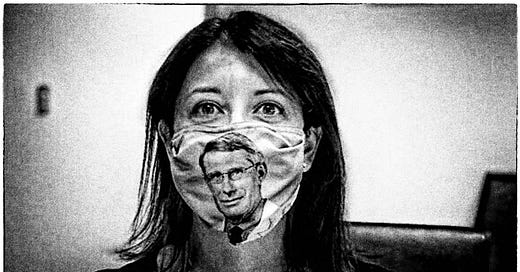






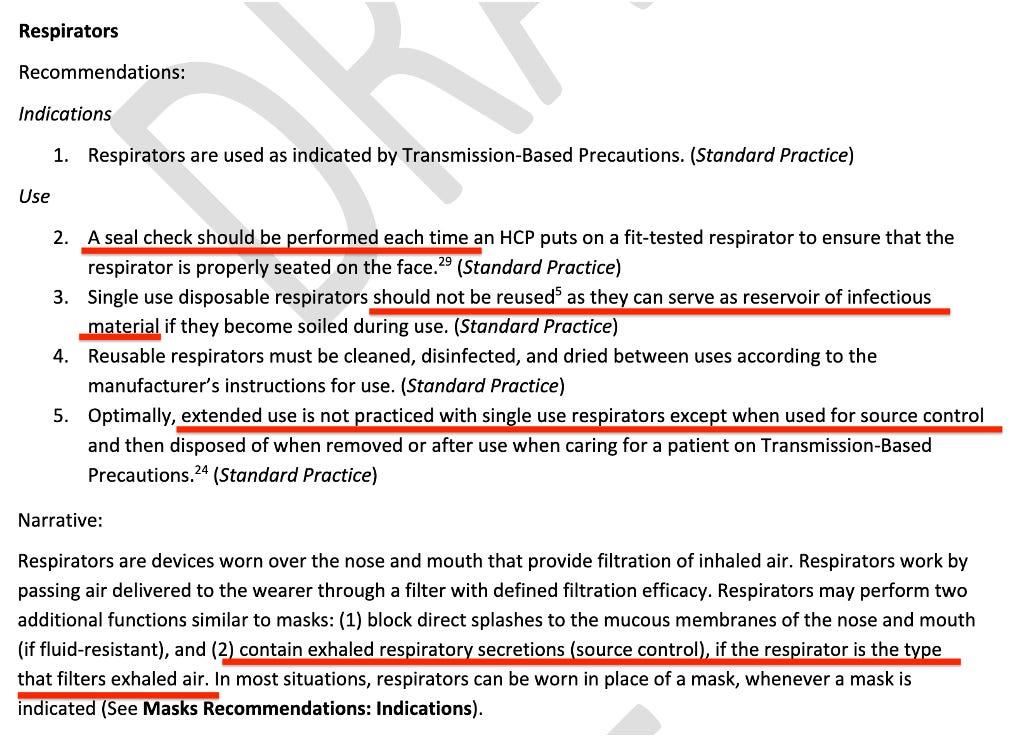

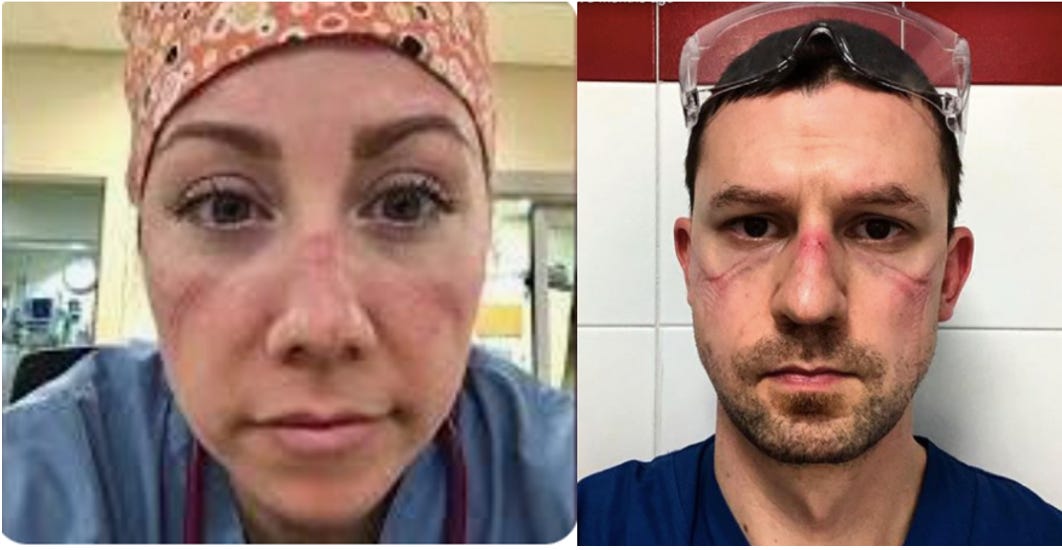
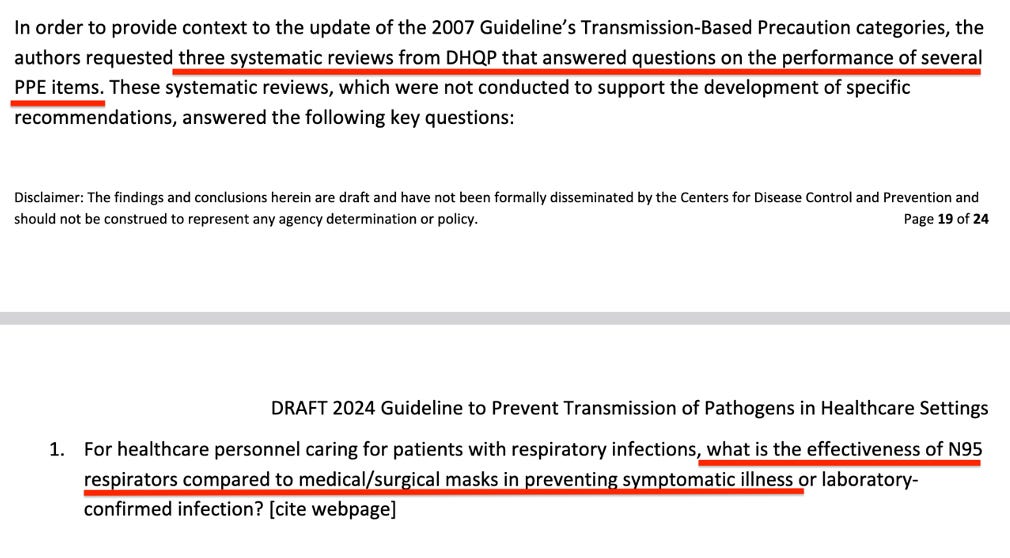
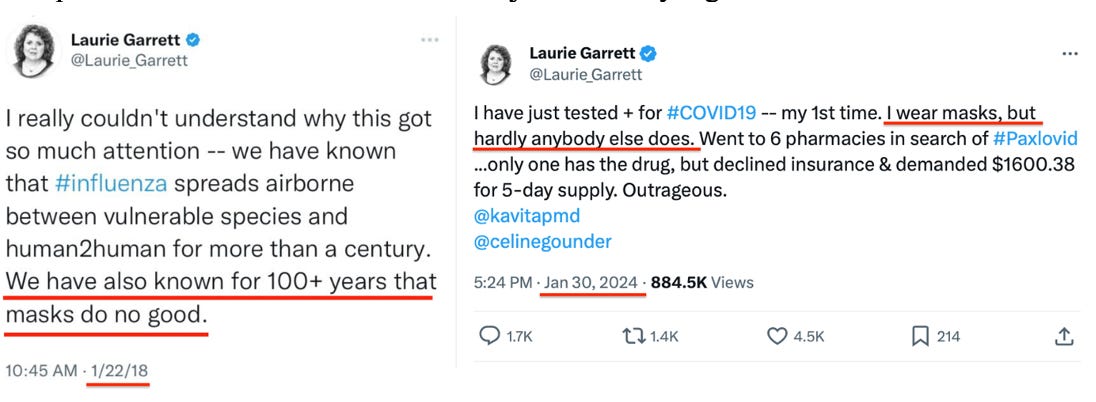
I volunteer in our local elementary school. Once school resumed and volunteers were allowed back into the buildings, I had to witness the tragic spectacle of children aged 5-12 forced to cover their faces for 8 hours a day with soggy, dirty, cloth masks. Masks were stuffed into a desk (or dropped on the floor) during lunch and then re-installed over the face when lunch was over. In many cases, the same masks were worn day in and day out without laundering. Children weren't "safe," they were just muzzled. You can't teach reading when both the teacher and student have their faces covered. And the reason for this heinous charade was that the CDC recommended masks in schools.
The face nappy became an outward signal of loyalty to the hygiene regime. Nothing else.
My biggest regret from the plague is that I participated a number of times in the technosegregationist division of society by allowing my QR Code to be scanned at restaurants and pubs I needn't have gone into while the unpure "unvaxxed" remained outside. My second biggest regret is I how often I complied with mask wearing despite knowing it to have been utterly pointless from a mechanistic biomedical standpoint. Indeed, social conformity pressures and hedonistic ease are quite the forces. 1930s Germany is now, post-plague, far less mysterious to me than it once was.
Great work as always Paul.